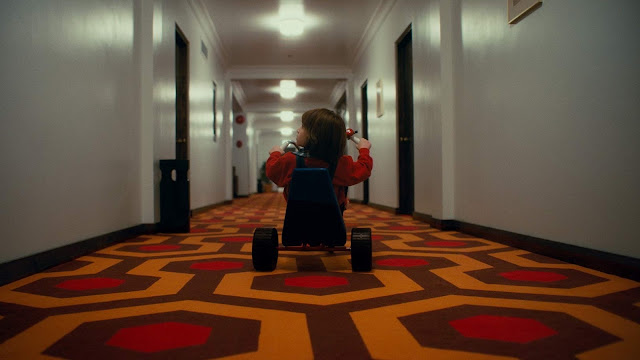"You shine on."

Genre filmmaker Mike Flanagan takes on the unenviable task of following up both the iconic legacies of master filmmaker Stanley Kubrick and famed author Stephen King in a sequel to both versions of The Shining. Doctor Sleep follows a grown-up Danny Torrance, last seen as a tike riding his big wheel and played soulfully as an adult by Ewan McGregor, thirty years later as he reconciles his supernatural powers with his childhood experiences in the spooky Overlook Hotel.
Doctor Sleep's complicated dark fantasy horror narrative explains much of the more serialized supernatural elements of King's terrifying 1977 novel (and his belated 2013 sequel of which this film is adapted from) Kubrick notoriously excised—much to the author's famous objections. The very clunky exposition and rough first act overexplain Danny's inherited alcoholism and trauma as he shuns his "shining" mind-reading gifts to get sober and lead a quiet life where he helps the elderly peacefully transition into death.
Danny's past and shining abilities are awakened when a powerful teenage girl Abra (newcomer Kyliegh Curran, the heart of the film), reveals her vast powers to others who also have the shining. Enter a playfully diabolical Rebecca Ferguson, as Rose the Hat, who leads a coven of like-minded nomadic demon-types who feed on the "steam" or soul and essence of others with shining powers. These life-sucking "True Knot" gang of generic horror villains are by far the most difficult element translated from the book to accept with their clunkily unclear decades-long motivations.

Once all the mystical powers are established and the story kicks into gear, the inconsistent rules make for some goofy scenes of steam-sucking life powers and transportive mind-reading visions that evoke the cinematic mutant powers of X-Men more than anything else.
Doctor Sleep is much more about reliving trauma and literalizing cycles of abuse than the well-known horror beats of King or Kubrick's interconnected works. Clocking in at a healthy two-and-a-half hours, the film struggles at times to balance all the competing elements of both novels and the 1980 film it's simultaneously sequel-izing.
Flanagan mostly succeeds in avoiding rehashing Kubrick and King's material and legacy despite often remaking and recreating some of their more iconic moments from The Shining. His vision of Doctor Sleep is much more cerebral and enthralling in its emotional stakes. It's a cinematic reckoning that impresses more than it sometimes misses.
More | YVArcade / AV Club / Indiewire / ScreenCrush / Slashfilm / Slate







0 reactions:
Post a Comment